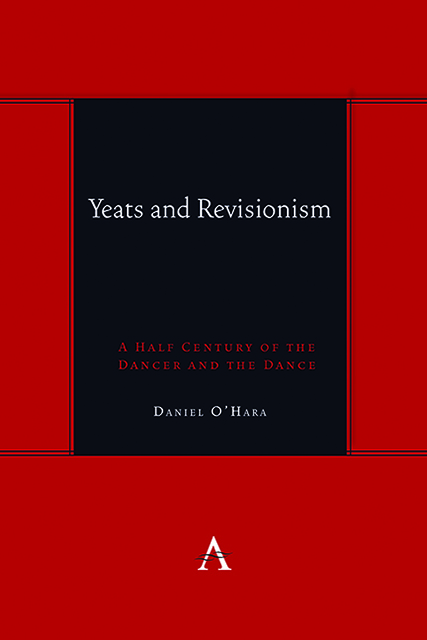Book contents
- Frontmatter
- Dedication
- Contents
- Acknowledgments
- Preface
- Introduction: Dancer and Dance: Yeats’s Romantic Modernism and Critical Revisionism
- Chapter 1 The Irony of Tradition in W.B. Yeats’s Autobiography: Dialectical Hermeneutics Beyond the New Criticism
- Chapter 2 The Specialty of Self-Victimization: On Antithetical Revisionism
- Chapter 3 Yeats in Theory: Blackmur, Bloom, De Man and Hartman
- Chapter 4 The Divisions of Yeats Studies Continued
- Chapter 5 Modernism’s Global Identity: on the Dogmatic Imagination in Yeats, Freud and Beyond
- Chapter 6 Yeats With Lacan: Toward the Real Modernism
- Chapter 7 The Spirit Medium: Yeats, Quantum Visions and Recent Lacanian Studies
- Chapter 8 And All the Ceremonies to Come: Of High Modernism, Visionary Violence and Post-Marxism
- Afterword: The Reader in Yeats
- Bibliography
- Index
Chapter 7 - The Spirit Medium: Yeats, Quantum Visions and Recent Lacanian Studies
Published online by Cambridge University Press: 08 June 2023
- Frontmatter
- Dedication
- Contents
- Acknowledgments
- Preface
- Introduction: Dancer and Dance: Yeats’s Romantic Modernism and Critical Revisionism
- Chapter 1 The Irony of Tradition in W.B. Yeats’s Autobiography: Dialectical Hermeneutics Beyond the New Criticism
- Chapter 2 The Specialty of Self-Victimization: On Antithetical Revisionism
- Chapter 3 Yeats in Theory: Blackmur, Bloom, De Man and Hartman
- Chapter 4 The Divisions of Yeats Studies Continued
- Chapter 5 Modernism’s Global Identity: on the Dogmatic Imagination in Yeats, Freud and Beyond
- Chapter 6 Yeats With Lacan: Toward the Real Modernism
- Chapter 7 The Spirit Medium: Yeats, Quantum Visions and Recent Lacanian Studies
- Chapter 8 And All the Ceremonies to Come: Of High Modernism, Visionary Violence and Post-Marxism
- Afterword: The Reader in Yeats
- Bibliography
- Index
Summary
The following essay–review seeks to outline a problem—the failure of contemporary critical discourse to address in a sustained and serious way the various global phenomena gathered under the term religion—and a possible analytic solution, which is the elaboration of an approach out of the Lacanian conception of “the Real.” Such an approach to religion would begin to speak, in the case of Yeats, the topic of my next book, of the unorthodox occult subject of religion, but on a basis of critical intimacy rather than distance.
Introduction: Working Assumptions
My work has taken a strange yet not unexpected turn. As the title of this unconventional review essay may suggest, it has recently centered, if that is the word, on strands of discourses—literary, scientific and psychoanalytic—which have one thing in common that I now understand has been my critical focus from the beginning of my career: visionary language and its cultural effects, particularly its promise, to the visionary thinker, of becoming divine, in the form of symbolic immortality. That Professor O’Hara finally understands what he has been doing, however, is not necessarily of interest even to a small public.
My newfound self-understanding was preceded by only several months after the events of September 11, 2001. My primary working assumption nowadays is that the World Trade Center catastrophe made visible and underscored in an unforgettable manner what has been emerging for some time: not a new world order but a new dark ages. In saying this, I do not assume that any side in the continuing political and military struggles represents civilization. In fact, I assume that all parties to the new global conflict are representatives of a new terror, a new terror that, ironically enough, demonstrates the greatest continuity in human history, that of religious vision. Our species may or may not constitute the earth as an ascetic planet, but it surely has made it and will continue to make it, now with an awful vengeance, an unearthly realm.
My corollary assumption, therefore, is that the Enlightenment with all its critical posts and modernities is over. I know that such an apocalyptic perspective is easily derided as irrational. But in light of the last century and a half of history, the most rational conclusion would seem to be precisely that reason, as theorized in the Enlightenment and after, simply does not exist.
- Type
- Chapter
- Information
- Yeats and RevisionismA Half Century of the Dancer and the Dance, pp. 115 - 134Publisher: Anthem PressPrint publication year: 2022

